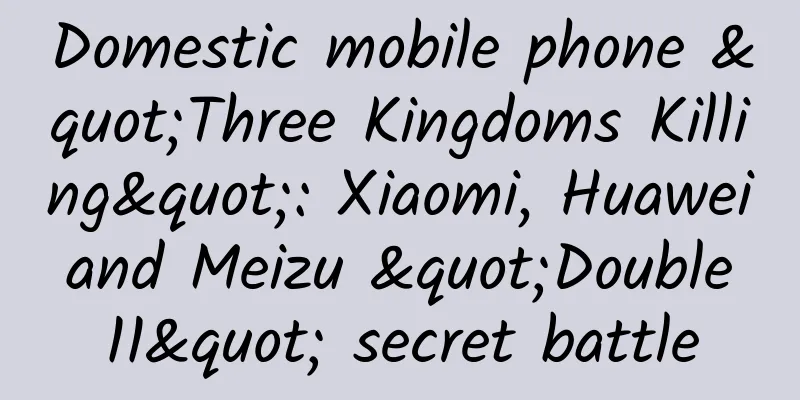Domestic mobile phone "Three Kingdoms Killing": Xiaomi, Huawei and Meizu "Double 11" secret battle

|
Domestic mobile phones achieved amazing sales on "Double Eleven", occupying three seats in Tmall's 2014 "Double Eleven" TOP10 ranking in all categories. Xiaomi, Huawei and Meizu ranked first, second and ninth respectively, staging a three-way battle for supremacy. At present, the competition in the smartphone market is increasingly fierce, with Apple and Samsung in the high-end market. Previously, Xiaomi has always been the leader in the domestic smartphone market with its Internet-based gameplay. However, in the mid-range market, with more and more players, increasingly fierce competition, and reduced profits, how can Xiaomi prove its position in the domestic smartphone market? Brand manufacturers need an opportunity, and "Double Eleven" has become an important opportunity. "Double Eleven" secret battle After entering the era of smart phones, mobile phones are close to the Internet and e-commerce. As standardized electronic products, they are naturally suitable for Internet sales. The best proof is that 1.89 million mobile phones were sold on Tmall alone during this year's "Double Eleven". However, the birth of this huge sales volume is the result of a secret war among three domestic mobile phone manufacturers using Internet thinking. Social marketing has always been Xiaomi's strength. It has continuously interacted with consumers through major forums, communities, WeChat, Weibo, QQ space, Baidu Tieba, etc., and offline activities in the form of local meetings and popcorn have won the hearts of Mi fans. Xiaomi is based on the "Mi fans" group and is good at converting traffic into sales. This coincides with the path of increasing sales during the "Double Eleven" event, which ultimately created sales of 1.56 billion yuan. According to Liu Qi, head of public relations at Xiaomi Technology, before "Double Eleven", Xiaomi had both the usual official website traffic diversion, social media warm-up and detonation, as well as small games giving out coupons and treasure hunting games to guide collections. It also had official traffic cooperation with Tmall, attracting a large amount of traffic through methods such as scanning codes and giving out coupons at about 300 offline service outlets. The traffic-generating effect was very obvious. As soon as midnight passed on the 11th, the payment amount exceeded 100 million yuan in just 4 minutes and 48 seconds. From then until the end of the event, Xiaomi's official flagship store always ranked first in the mobile phone category and Tmall's entire network store rankings. During the "Double Eleven" period, "fastest to break 100 million" and "highest sales" were two concepts that merchants paid close attention to and that could easily trigger a viral effect. When both concepts were swept away by Xiaomi, this situation was completely expected by Li Nan, Vice President of Meizu Technology. He said: "We ranked first in the first minute, then we dropped to second. After the MX4 ran out of stock, we dropped to third. The main reason was the MX4 stock problem. There were only 60,000 units, and pre-order users were given priority, which meant that the pre-order users' stock had to be met first, so there were only 30,000 units available." On the 11th, he, who had been on duty at Alibaba's Xixi Park, also adjusted his strategy in time according to the plan. "We actually face two choices, should we pile the goods on Tmall or distribute them to other channels? We chose to distribute the goods. In fact, after the goods on Tmall were sold out in seconds, many users didn't know that we also had goods on JD.com and Suning." Li Nan said. Unlike Xiaomi and Meizu, Huawei's mobile phone promotion is more solid under the leadership of the well-known brand "Huawei". According to Bai Yi, the public relations director of Huawei's Honor brand, the sales of Huawei mobile phones this time were mainly achieved by the Honor series. In terms of promotion, WeChat mini-games were used to attract users' attention in the early stage, mainly to convey that users can participate in the Tesla lottery. Then, a pre-deposit discount purchase activity was launched for the hot-selling Honor 6, which can enjoy same-day delivery. "The activities on the 11th are more targeted, with gifts and accessories discounted on the same day. Honor headphones, bracelet coupons, APP gift packs, etc. are directly given to users who purchase the phone. These are activities that bring benefits to users and increase user participation." Bai Yi said. Wang Jimin, an O2O research expert, wrote that as long as traditional enterprises have a solid foundation in products and are equipped with the wings of Internet thinking, they will rise quickly and have the momentum to catch up with Xiaomi. Huawei mobile phones are a typical example in this regard. They have learned and copied Xiaomi's Internet strategy, especially the Honor series, which chose to cross-border cooperate with large Internet companies, using the social communication advantages of partners to create social marketing and strengthen brand influence. Its development momentum is likely to surpass Xiaomi mobile phones. During the "Double Eleven" event, Huawei's mobile phone sales were 1.06 billion yuan. If Xiaomi's sales of 1.56 billion yuan were subtracted from products other than mobile phones, the final sales gap would be even smaller. The significance of charting Xiaomi, Huawei and Meizu, the three major domestic mobile phone brands, usually do very well in sales on the Internet. Xiaomi in particular still only has online sales channels. Why does it spend so much effort to boost sales during "Double Eleven"? Can its supply chain system support it? Are there other considerations behind it? In Li Nan's view, "from the perspective of communication, if the volume of 'fastest to break 100 million' is 100, then the volume of other data is 60." Enterprises are more concerned about the benefits that concepts such as "Double Eleven", "fastest to break 100 million" and "highest sales" bring to the brand, as well as the influence in the e-commerce circle. It is similar to the brand premium space brought by the CCTV bid winner in the past, which made many bosses raise their hands regardless of everything. The only interesting contrast is that the 2015 CCTV bidding that just ended last week began to downplay the concepts of total transaction volume and bid winner, and the battlefield for enterprises to compete began to shift to the new economy field, and the annual "Double Eleven" full category and category rankings have become a communication point that makes merchants crazy. However, in this pursuit, the speed of corporate reflection is faster and earlier than CCTV's bidding. Li Nan believes that "the essence of Double Eleven is that Alibaba has spent a lot of publicity to gather traffic to this day, the media also pays close attention to this day, and brands also pile up goods on this day. Double Eleven is ultimately a day to exchange sales for reports, to earn the attention of media reports and market users, and to tie everyone up. But playing with single-day sales, this gamble is a bit abnormal. If you want to get this indicator, you must be out of stock before and after. You cut off for a month, I cut off for three months, and squeeze it all into November 11th." In addition to sales and brand considerations, companies also see "Double Eleven" as an opportunity to maintain fans and communicate directly with fans. In Bai Yi's view, "Double Eleven" has become an annual carnival festival for e-commerce platforms. Since Huawei usually has a strict price system, there are not many opportunities for discounts, so Honor takes this opportunity to give back to users and is more likely to cultivate the loyalty of "pollen". Liu Qi also said that Xiaomi has two major e-commerce festivals, one is the Mi Fan Festival in April, and the other is Tmall's "Double Eleven". "Xiaomi's participation in "Double Eleven" is not too focused on sales, but on honing the team and improving e-commerce service capabilities. For example, this year's Mi Fan Festival Xiaomi Logistics Team created a record of 560,000 outbound delivery orders in a single day. Xiaomi Logistics' "Double Eleven" total outbound delivery orders reached 937,000 orders in a single day. The 10 major distribution centers shipped 24 hours a day, and it took only 3 days to complete the delivery." Liu Qi said. However, if "Double Eleven" is regarded as a peak time for orders, how mobile phone manufacturers adjust their supply chain systems to match the response to the massive orders, how to coordinate the rhythm of normal sales and large-scale promotions, and how to allocate the quantity of goods on different e-commerce platforms all require manufacturers to have longer-term planning. During the interview, Xiaomi and Huawei both prepared enough goods for "Double 11" to ensure that every consumer who placed an order could get the phone they wanted. However, the distribution of the number of goods on the sales platform was different for each company. For example, Xiaomi put all its resources and sales targets on Tmall during "Double 11". However, based on big data analysis, it was found that people in different regions liked different Xiaomi products, so it only made effective optimizations in warehousing and distribution in advance to increase delivery speed.Meizu emphasizes the balance of various platforms, and the ultimate goal is to ensure that consumers can get the goods, rather than letting them go to scalpers. "We actually have enough goods, but we don't put them on Tmall alone. If we can't become the brand that 'breaks 100 million the fastest', we would rather put the goods on more platforms and offline channels to ensure that users can get them." Li Nan said. Huawei's choice is to cover almost all e-commerce websites, and finally ranked second in all categories on Tmall, and ranked first in mobile phone categories on JD.com, Amazon, No. 1 Store, Vipshop, Suning.com, etc. As a winner of Toutiao's Qingyun Plan and Baijiahao's Bai+ Plan, the 2019 Baidu Digital Author of the Year, the Baijiahao's Most Popular Author in the Technology Field, the 2019 Sogou Technology and Culture Author, and the 2021 Baijiahao Quarterly Influential Creator, he has won many awards, including the 2013 Sohu Best Industry Media Person, the 2015 China New Media Entrepreneurship Competition Beijing Third Place, the 2015 Guangmang Experience Award, the 2015 China New Media Entrepreneurship Competition Finals Third Place, and the 2018 Baidu Dynamic Annual Powerful Celebrity. |
<<: IBM versus Amazon Cloud Computing: Can Big Blue disrupt itself?
>>: Full text of Li Ruigang's stunning speech: Subversion and Reshaping
Recommend
An analysis of the operation of a maternal and infant APP product activity
This month we planned a WeChat fan-raising activi...
After so much group sharing, your community is still half-dead?
Community entrance: high-quality content Think ba...
How to get more recommendations on self-media platforms?
This article will talk to you about the article r...
How does a QR code work? What do the black and white squares represent? | Digital Literacy
Audit expert: Jing Yuan, Intermediate Accountant ...
Play user behavior path analysis, 3 methods are enough
This article will introduce three commonly used a...
Analysis of classic popular articles on Xiaohongshu brand!
In the brand promotion of Xiaohongshu, a hot arti...
The six easiest programming languages to learn for beginners
【51CTO.com Quick Translation】Learning programming...
Why did life evolve the function of death?
Survival or destruction? This is not only a philo...
What should I pay attention to when developing WeChat mini-programs in Lanzhou? What are the procedures for developing WeChat mini programs in Lanzhou?
What should I pay attention to when developing We...
JD spare parts library domestic sales channel Baidu cloud download
JD Spare Parts Domestic Sales Channel Introductio...
Android phones have exceeded 20G of RAM! How much RAM is enough?
How much running memory is enough? Today, the edi...
How to analyze live streaming traffic!
There are two topics today. The first one is &quo...
Fission Methodology: How to achieve precise fission and improve paid conversions?
Last week, I helped a friend implement a project....
Paid social and paid communities: Let’s talk about community value and community operation!
In this era where "free + value-added + adve...
How to promote a newly launched APP?
Mainstream App Customer Acquisition Channels 1. A...









